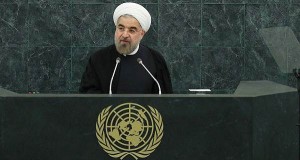 As the World Economic Forum (WEF) kicks off Tuesday in the snowbound Swiss town of�Davos, more than 40 heads of state and government will be competing to make a lasting impression, for themselves and their countries, among the 2,500 participants. Here are five who will have a head start:
As the World Economic Forum (WEF) kicks off Tuesday in the snowbound Swiss town of�Davos, more than 40 heads of state and government will be competing to make a lasting impression, for themselves and their countries, among the 2,500 participants. Here are five who will have a head start:Hassan Rouhani
Depending on how things are progressing in another part of�Switzerland�� Montreaux, scene of the Syria peace talks � Iran�s president may be just a little distracted during his Davos debut. But the purpose of his trip is to take advantage of the momentum from the Jan. 20 start of the six-month nuclear freeze agreement between Iran and the six world powers. Rouhani�s message: As the negotiating parties begin work on a long-term deal, Iran is open for business. It isn�t really: most of the economic sanctions imposed by the U.S. and Europe remain in place. But Rouhani�s trip is mostly about optics. Iran, he will be saying, is no longer an international pariah. He delivers a special address on Thursday.
Benjamin Netanyahu
Israel�s prime minister follows Rouhani (a few hours later) with a discussion on Israel�s economic and political outlook. Netanyahu will keep up his rhetoric about Tehran being an unreliable negotiator. Don�t buy the peace deal, he will say, it�s just a smokescreen that allows Iran to build nuclear weapons. But that message didn�t get much traction at the U.N. General Assembly in New York City last fall, where Rouhani�s charm offensive won the day. Netanyahu is unlikely to find many takers in Davos.
Enrique Pena Nieto
Mexico�s president is one of the WEF�s Young Global Leaders, and his country is making a splash at Davos this year. He will be seeking to capitalize on Mexico�s growing economy, which has recently become the country�s dominant narrative, overtaking the usual stories about drug cartels and kidnappings. If potential investors are impressed by energy, Pena Nieto will display plenty of it: he will deliver a special address and participate in two panel discussions, all on a single day, Thursday.
Dilma Rousseff
The president of Brazil makes her first appearance in Davos just as tough questions are being asked about her country�s economic prospects. Three years of lackluster growth have some wondering if Brazil should lose its place among the BRICS. There are doubts, too, about the country� ability to host soccer�s World Cup this summer. Top all that off with lingering fears of political unrest, after last year�s massive street demonstrations. Rousseff delivers a special address on Friday.
Shinzo Abe
Japan�s prime minister has stirred things up in Asia over the past couple of years. His country�s economy has been doing remarkably well, but Abe�s aggressive rhetoric and military muscle-flexing has annoyed China and South Korea, while winning some praise from other Asian nations that see Japan as a bulwark against an increasingly militaristic China. The Chinese president and prime minister won�t be at Davos, but perhaps South Korea�s President Park Geun-Hye will have a cautionary word or two? Abe and Park both speak on Wednesday.
By Business Time
The Iran Project is not responsible for the content of quoted articles.










